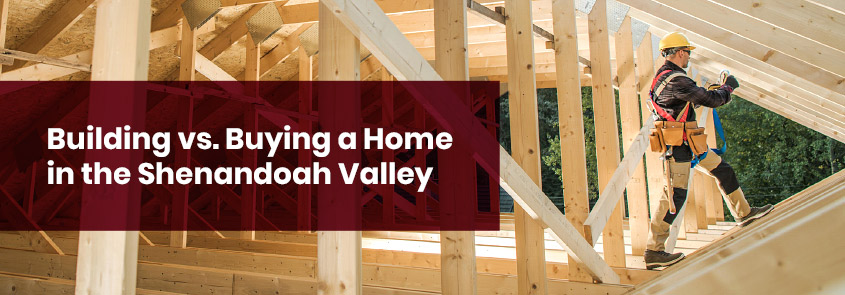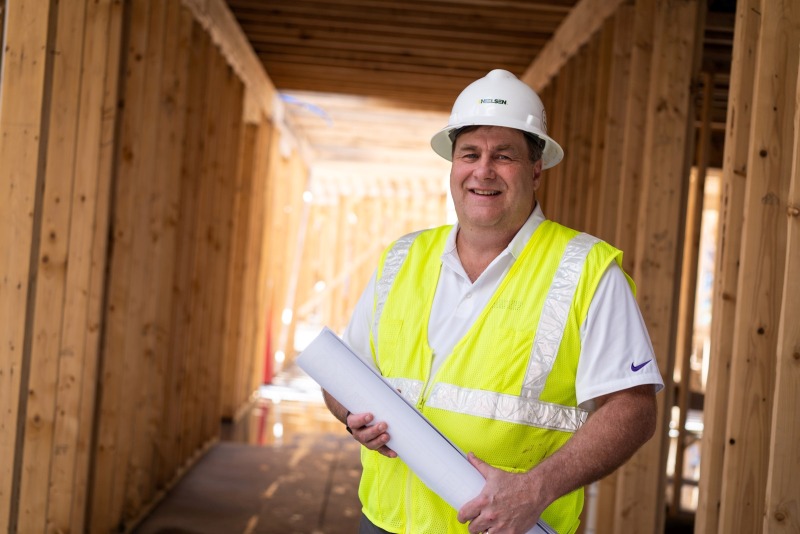Building vs. Buying a Home in the Shenandoah Valley
One of the most exciting times in your life can be moving into a new home. You have saved for your down payment and are ready to begin the decision-making process, but now you may have new questions arising. Should I be building or buying my house? How likely is it for me to find my ideal home in today’s housing market? Houses in the Shenandoah Valley tend to be available for only a short time before they are bought, so it can be difficult to find exactly what you are looking for. This guide will help outline the differences between building and buying your house, along with insights from experts on the F&M Mortgage team to help you find your dream home.
Buying a House in Virginia
Advantages of Buying a Home
Some home seekers may want to purchase a home that is already finished and ready to occupy due to their desired timeline for moving in. Buying an existing home can meet this need, along with other advantages. Buying an existing home opens the possibility for price negotiation, depending on the seller and overall market conditions.
Buying a home tends to be a straightforward process, typically requiring a standard mortgage. However, those looking to buy may learn that closing on an already built home in today’s market is not as easy as it may seem.
Disadvantages of Buying a Home
Buying a house is an important financial decision, so many home seekers may find themselves wanting to find their dream home on the market rather than settling for anything less. Compromising for other options may even impact your enthusiasm for moving entirely.
The residential real estate market in the Shenandoah Valley today moves quickly, with many homes being sold before buyers get the chance to plan and decide. Thankfully, building your new home is a viable option for those who are having trouble finding what they’re looking for on the market.
Building a House in Virginia
Advantages of Building your Home
When building your home, you have more flexibility and decision-making influence over the design of your house, down to the little details. This includes the floorplan, cabinets, and paint being aligned with your vision on the day you move in. Also, while those buying an existing house can often run into unexpected maintenance costs soon after they close, having a newly built home will afford you being under warranty for years to come. This includes new appliances, HVAC systems, and roofing. This can help put you at ease without having to worry about additional costs soon after making the financial decision of relocating in the first place.
Disadvantages of Building your Home
While building your home is a great alternative to those struggling to find the right existing home on the market today, it may not be the right fit for everyone. Depending on where you are moving from, you may need to be paying for two homes at once until you are able to sell your previous house. It is also important to consider where you will be living throughout the building process and the related expenses. Construction Loans have their differences among other types of mortgages, so we asked our lending team to provide their expertise below.
Ask An Expert!

Looking for answers to frequently asked questions about construction loans and the home building process? We reached out to contractors and our mortgage advisors to be your resource. You can review the following insights from our team to learn more:
How has the pandemic impacted the construction process?
We have been experiencing an extended lead time on materials due to manufacturing delays. Many plants have been forced to reduce capacity based on various state laws. When COVID hits a plant, they may even shut down for two weeks, all of this on top of increased demand. We have also seen price increases coming more frequently since the onset of the pandemic.
- Jill McGlaughlin, Classic Kitchen & Bath
In the early stages of the pandemic, many homeowners started DIY projects like deck additions/replacements or outdoor playhouse construction. This led to a huge spike in pricing for pressure treated lumber. At the same time, the low housing inventory in the Shenandoah Valley drove an increase in new home construction. Some items have become hard to find, or the lead time is 4 times as long pre-COVID. Currently, this is the market condition with no real end in sight.
- JM Monger, S. Monger & Sons
Questions for a Contractor
J.M. Snell II, Valley Renovators
What should I consider when deciding to hire a builder?
I believe the most important part of deciding on a builder is relationship. It is the largest purchase most people will ever make, and building a home is an extensive process. The ability to converse openly without fear of embarrassment is critical. Start with doing your own research and finish with an interview.
What are my responsibilities during the construction process?
It starts with a complete understanding of the contract details and progresses to regular, onsite review with a particular focus at key milestones. For example, completion of framing, completion of rough-ins, and obviously final walkthrough inspection. Regularly review your contract documents.
Do you recommend purchasing a house plan online or working directly with an architect?
If you find a plan online from a reputable source that is perfect as drawn, it will be the less expensive route. If the plan you find online isn’t quite right, you are better off doing a design with an architect or builder that offers design build.
Do all decisions need to be finalized before construction begins?
No, BUT realize that changes often result in additional work and expense. The more you can finalize your selections for the original contract, the better. Do your homework by shopping and educating yourself about key concepts that will save money over the life of the home. For example, insulation levels above code requirements, SEER rating on heating/cooling equipment, hot water recirc with insulated pipes, gray water systems, etc.
On average, how long does the construction process take?
Pre-contract negotiation can easily be a month without design time, and the permit process is generally a month. From permitted to completion without changes can be at minimum a 23-week schedule.
Questions for a Contractor
Gary Crummett, Gary Crummett & Sons, LLC
What should I consider when deciding to hire a builder?
You should find a builder who builds to the level of quality that you expect. Different builders build to different quality levels. The best way to find a builder is by word of mouth. Ask your neighbors and friends for recommendations. You will find that one or two names are consistently mentioned. Also, keep in mind that the better builders are busy, so you should plan ahead to allow them to make time for your home in their schedule.
What are my responsibilities during the construction process?
Homeowners should try to make decisions in a timely manner to not impede progress. It is also important that the homeowner convey their vision and expectations to the contractor before the work is done.
Do you recommend purchasing a house plan online or working directly with an architect?
I recommend beginning the process by looking at plans online. This is less expensive provided you can find one that meets your needs and style. Your builder should be able to make minor changes to the plan. However, if you are unable to find a plan you like, you will need to have plans custom drawn by a local draftsperson.
Do all decisions need to be finalized before construction begins?
Major decisions should be finalized before construction begins. Items that a homeowner selects, such as floor coverings, light fixtures, etc., do not have to be final before construction begins, but those decisions need to be made in a timely manner to not delay the progress. Even with the goal of making all decisions upfront, it is realistic to expect that a few changes will occur along the way. Be sure you address how changes will be handled with the builder.
On average, how long does the construction process take?
Construction of a new home can take 7 to 9 months to complete.
Questions for an Advisor
Lisa Wisner, Mortgage Advisor
What is the difference between construction loans and other home loans?
A construction loan is any loan that provides for turning raw land into a completed home. This term encompasses site-built homes as well as manufactured and modular homes. Your initial construction loan is an interest-only mortgage loan, whereby you make monthly payments of only interest, based on the amount that has been paid out to the builder at the time of billing. At completion of construction, F&M Mortgage will update the credit, income, and asset documents to refinance the interest-only mortgage into a final 30-year fixed mortgage.
On at traditional purchase loan, the home is ready for you to move in as soon as closing occurs. The processing and underwriting of construction or traditional purchase loans is the same.
Does my lot need to be paid off to apply for a construction loan?
Our construction loan can roll the payoff of the land loan (or the purchase of the land) into the construction loan closing. Any down payment made on the land is credited toward the down payment required on the construction loan, provided the value of the land itself exceeds the amount owed. Additional down payment requirements may apply, based on borrower qualification.
When in the process is a down payment required for a construction loan?
Down payment is due at or before closing on the construction loan, which occurs prior to any work beginning on the project.
At what point should I consider a construction loan during my home search?
You can investigate both construction and traditional purchase simultaneously as you are looking for your perfect home. The decision to go with construction over traditional purchase is a personal decision and is impacted by your timeline for getting from your current living situation into your new permanent home. I would recommend investigating both loan scenarios initially, so you can gather all the information you need to make informed decisions.
How has the pandemic impacted construction lending?
We have seen a significant increase in the cost of building materials, timelines for appraisals and title work, and factory backlogs for modular and manufactured homes due to increased demand and occasional labor shortages as a result of the pandemic. F&M Mortgage is committed to keeping you informed and providing proper expectations during the approval process. We work diligently to keep you moving forward as quickly as possible.
Questions for An Advisor
Veronica Amato, Mortgage Advisor
When in the process is a down payment required for a construction loan?
When the construction loan is closed, your down payment is required, unless the land has enough equity to be accounted for down payment.
At what point should I consider a construction loan during my home search?
When your realtor recommends that what you are looking for is not going to be available.
Contact F&M Mortgage
F&M Mortgage works with builders and home buyers directly to ensure a seamless and user-friendly construction loan process, helping you and your clients build dreams into reality. From Harrisonburg to Staunton and across Augusta, Page, Rockingham, and Shenandoah counties, F&M Mortgage and F&M Bank are your local home construction lenders, offering construction loans for as little as 5% down. Learn more or apply now for your new construction loan!
Flexible lending options from a team of local lenders familiar with your community make F&M Mortgage the ideal lender for your home loans. In-house decision making simplifies the process and competitive rates get you the most for your money. Get started now!
Are you a first-time home buyer? Check out our guide for Virginia!






